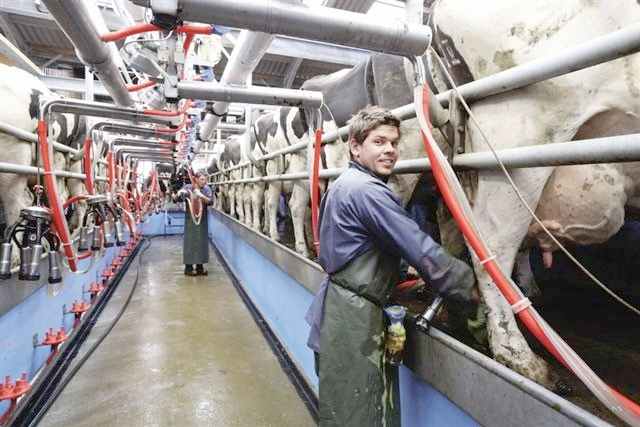
With effect from 1st November First Milk will be cutting the price for its manufacturing pool by 0.3 pence per litre and for its liquid pool by 1 pence per litre.
Chairman Sir Jim Paice MP commented: “Since the start of September there have been three Global Dairy Trade auctions. Two of these auctions, including the one yesterday, have shown downward trends.
“Additionally, our milk production shows no sign of slowing down, and we are up 10% over the last few weeks alone. With our main sites operating close to maximum capacity, the vast majority of this additional volume is ultimately going into Westbury where net returns are below 20ppl.
“As well as maintaining our focus on doing whatever we can within our influence to mitigate the impact of these negative market conditions, we will continue to keep our milk prices in line with our projected market returns."
Arla Foods recently announced a cut of 1.67ppl for its milk price paid to UK farmers, Tesco Sustainable Dairy Group (TSDG) members will be paid a reduced 32.01ppl for their milk. And Dairy Crest will close two factories, in what it called a 'challenging trading environment', which will put 260 jobs at risk.
"The biggest cut so far, not yet made public is Muller Wiseman with a massive 1.9ppl due to appear to its producers sometime next week. Muller apparently are very aggrieved that Farmers For Action got this information so early and are accusing their Farmer Board for the leak," the FFA said.
Wyke cheese cut again 1.5ppl, in what it described as a weak market.
Commenting on the reductions, Ash Amirahmadi, Arla UK’s head of milk and member services said: “Globally, milk production has increased by circa four to five per cent, which is out of sync with a lower increase in global demand of circa one to two per cent. This imbalance is resulting in large stocks and, as a consequence, markets have dropped sharply.
“Furthermore, Chinese demand continues to be sluggish and the Russian import ban is continuing to have an impact on European industry prices. This negative pressure is having a significant effect on Arla’s milk price.”
NFU Scotland’s Dairy Policy Manager George Jamieson commented: “If milk buyers are genuinely paying as much as they can, which is the case with co-ops, then the performance of the business must be challenged. Are private buyers genuinely sharing risk and reward, or setting prices based on competitor’s prices?
“This should not be the case anymore. Arla for example base its price on an objective mechanism based on performance of the business, which is now global, and only indirectly influenced by the UK market, therefore it should not be green light for UK processors to drop prices per say.
“Over 2013, commodity values were historically high. UK farm gate prices rose too slowly and not to as high as should have. Last summer when market indicators very clearly and consistently rising up to 39ppl indicating that 37 ppl should have been achievable by at least some buyers, but we did not get close, with 34ppl the best.
“So when farmers are told that 30ppl is in line with the ‘market’ then why should this not be the case when wholesale prices are at their peak?
“The argument that these levels of prices are not achievable should look at the prices received by our European competitors, who did reach higher prices and at faster rate.
“Farmers should judge their milk buyer based on performance over the longer term. Dairy companies, whether a co-operative or PLC, must be judged on their performance, not on their competitor’s performance.
“We are now in a global market, but the UK farm gate price still largely remains below European, even New Zealand prices.
“In an increasingly competitive dairy world, UK dairy farmers, who are genuinely competitive, must ask their processors if they are.
“Elected farmer representatives, whether co-op or private must ask their milk buyers exactly why prices have dropped. Individual milk processors who value their supplying farmers must explain exactly why they are dropping prices, and farmer reps must be professional and able enough to challenge this.
“Tit for tat prices moves are not acceptable as this is pricing based on competitor’s performance and not on their, which is clearly an issue farmer reps should address.”
First Milk chairman Sir Jim Paice MP said: “Although there are signs that the dramatic falls in price for most commodities are behind us that does not mean that the consequences are not still being felt. These prices fell by almost 30% which is considerably more than the milk price has fallen. In addition the extra supply during the flush, which was paid for at the higher price, has to be sold after prices have fallen. All this has resulted in the actual milk prices that ourselves and some other players have now announced.
“While we cannot control global and European market prices, the Board of First Milk is working hard to improve the situation and has reduced overheads considerably and will continue to do so. We are also constantly analysing prices from various dairy markets to ensure we move milk around where possible to maximize returns. We are as anxious as all members to see the end of price cuts.”
